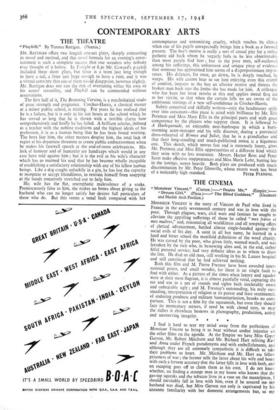CONTEMPORARY ARTS
THE THEATRE
"Playbill." By Terence Rattigan. (Phenix.) Ma. RarrmaN offers two longish one-act plays, sharply contrasting in mood and method, and this novel formula for an evening's enter- tainment is such a complete success that one wonders why nobody ever thought of it before. In Tonight at 8.30 Mr: Coward's p:aybill included three short plays, but three is a team just long enough to have a tail, a litter just large enough to have a runt, and it was a virtual certainty that one of them would disappoint, however slightly. Mr. Rattigan does not run the risk of overtaxing either his own or his actors' versatility, and Playbill can be commended without reservations. The first half of it, The Browning Version, is a psychological study of great strength and poignance. Crocker-Harris, a classical master at a minor public school, is retiring. For years he has realised that he is a failure, but it is only in his last hours at the school which he has served so long that he is shown with a terrible clarity how comprehensively and finally he has failed. A brilliant scholar, imbued as a teacher with the noblest traditions and the highest ideals of his profession, it is as a human being that he has been found wanting. The boys fear him, the ether masters despise him, the total lack of regret at his departure threatens to create public embarrassment when he makes his farewell speech at the end-of-term celebrations. His lack, of humour and of humanity are handicaps which would in any case have told against him ; but it is the evil in his wife's character which has so maimed his soul that he has become wholly incapable of establishing a satisfactory relationship with any of his fellow human beings. Like a dog caught unluckily in a gin, he has lost the capacity to recognise or accept friendliness, to restrain himself from snapping at the hands tentatively stretched out to help him.
His wife has the flat, unemphatic malevolence of a snake. Promiscuously false to him, she makes no bones about giving to the husband who can no longer satisfy her desires full particulars of those who do. But this seems a venal fault compared with her
contemptuous and unremitting cruelty, which reaches its climax when one of his pupils unexpectedly brings him a book as a farewell present. The boy's motive is really a sort of casual pity for a. rather pathetic old hack whom he vaguely feels to be less objectionable than most people find him ; but to the poor man, self-outlawed among his sufferings, this unforeseen and unique piece of evidence that someone has appreciated him seems of a d:sproportionate impor- tance. His defences, for once, go down, he is deeply touched, he weeps. His wife cannot bear to see him enjoying even this crumb of comfort, imputes to the boy an ulterior motive and thrusts the broken man back into the limbo she has made for him. A colleague who has been her lover revolts at this and applies moral first aid to her victim, so that when the curtain falls we are aware of the embryonic stirrings of a new self-confidence in Crocker-Harris.
Subtly conceived and skilfully written—only the headmaster spills over into caricature—this piece is acted with brilliance by Mr. Eric Portman and Miss Mary Ellis in the principal parts and with great competence by the players who support them. It is followed by A Harlequinade, an enjoyable near-burlesque in which a barn- storming actor-manager and his wife discover, during a provincial dress-rehearsal of Romeo and luliet, that he is a grandfather and that their long-standing and much-publicised union is .a bigamous one. This sketch, which moves fast and is extremely funny, gives Mr. Portman and Miss Ellis opportunities of a different kind which they seize with no less assurance. Messrs. Hector Ross and Peter Scott make effective reappearances and Miss Marie Lohr, batting late in the innings, scores heavily. Both plays are produced with much discrimination by Mr. Peter Glenville, whose recent work has been


































 Previous page
Previous page